For startups and new businesses, the TLD (top-level domain) of domain names pose a bit of a dilemma. Do you go with a .sg or .com.sg or just go with a generic .com or .biz? What impact will this have on your Search Engine results and the kind of traffic that you will see coming to your website?
In this post, we share some real world examples that will help you decide which will work best for you as a business operating in Singapore.
Your Domain Name and Local SEO
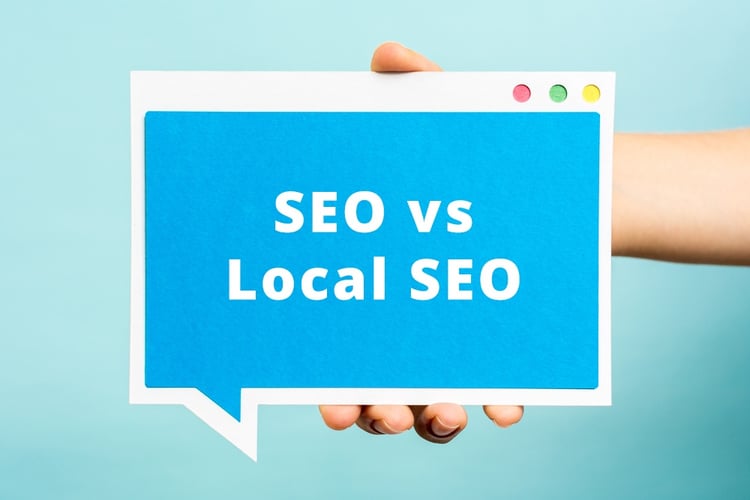
But first you will need to select your domain name—if you need help with that read our primer on selecting a domain name for your business. Now you've picked your domain name but you still don't know whether a .com or a .com.sg will work better.
In Singapore, there is a rather big price difference in annual registration fees between the .com TLD and a .sg TLD (for .com.sg or .sg, fees generally range between $50-80/year; non-Singapore specific names such as .com or .net go for much cheaper, around $7-15/year).
Country code top-level domain (ccTLD) is one of the best ways to show search engines and users where the site originates.
If your potential clients mostly reside in Singapore, all things being equal, a .sg domain will rank better in a Singapore user’s SERP than a generic .com or another ccTLD like .us or .uk.
Another reason why you might want to opt for a .com.sg name would be if you were opening up a Singapore branch of an international company. This would allow you to highlight your presence here in Singapore while simultaneously providing you with a platform to insert localised content.
But before you jump the gun and go for a .com.sg, bear in mind a couple of things. There are local regulations in terms of using .sg or .com.sg; also, sites like Amazon appear top for many products without a .sg domain. If that wasn’t persuasive enough, local companies like Capital Match also outperform large local banks for competitive financial products like invoice financing despite operating on a .com domain. The takeaway is that no single factor will dominate your SEO outcome.
How does Local SEO Work?
Local SEO works by taking into account the geographic location and browsing history of the user. For example, if a person who lives in Singapore and has a largely localised browsing history, searches on Google for “pet stores” in Singapore, the SERPs will likely prioritise ads and search results based on that data.
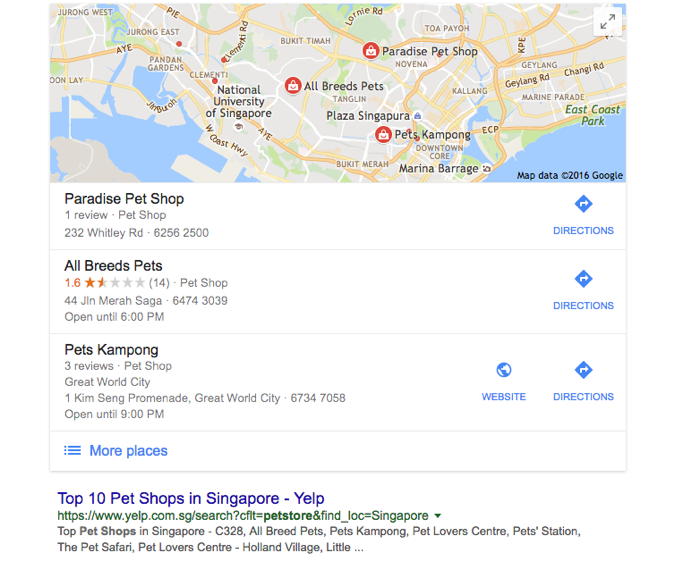
One could argue that for local brick and mortar services, local SEO is even more important than SEO. Certain search terms such as "plumbing singapore," "car workshop singapore," "pet shops singapore" will always return a local map pack as seen in the screen shot above.
There are literally hundreds of millions of domain names in existence worldwide, so making your website stand out is tricky. Local optimisation may help on this level as it narrows your competitors down significantly.

Here are a couple of examples to illuminate the benefits of local SEO in that gladiator pit of SEO: E-commerce.
Two Local Singapore SEO Examples via E-commerce
Diaper Cakes
Local search results are favoured for searches that have locally relevant results. Below are screenshots of searches in Google-US and Google-SG for the search query ‘diaper cakes’. The difference is stark.
Diaper Cakes (Google-US)

Diaper cakes trigger a clutch of Google Shopping results, followed by images of diaper cakes. The organic search results don’t yield e-commerce results at the top.
Diaper Cakes (Google-SG)
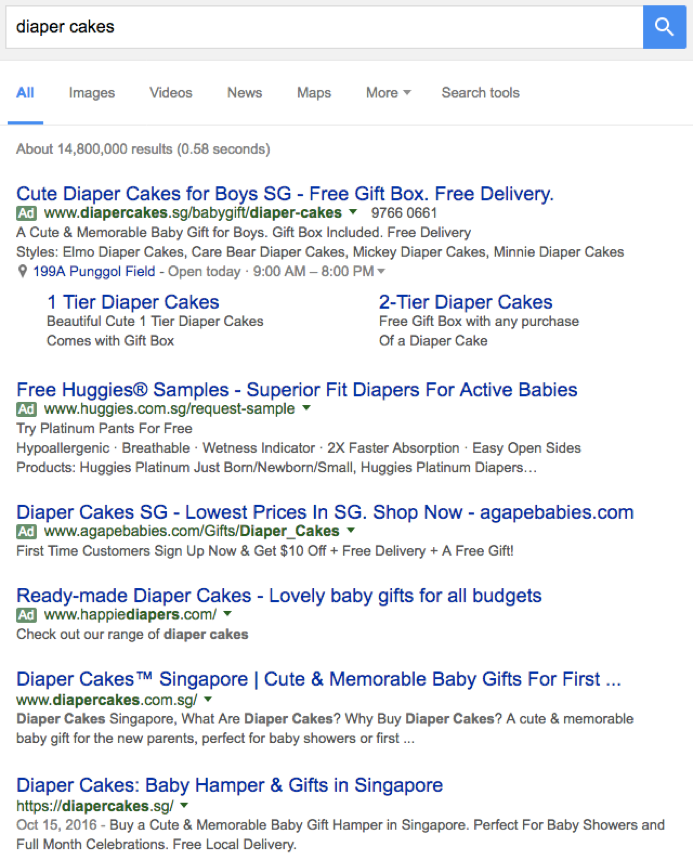
When we perform a search for diaper cakes on Google-SG though, we see that the top two organic search results are e-commerce stores, and are targeted to Singapore. Both these websites are minnows compared to Buzzfeed and Pinterest in terms of SEO authority. However, when it comes to local search, they are considerably more relevant.
Digital Cameras
There is a similar story for digital cameras as there is for diaper cakes. Searching a specific e-commerce product yields different results even when the competition are world-famous e-commerce giants.
Ricoh Theta S (Google-US)
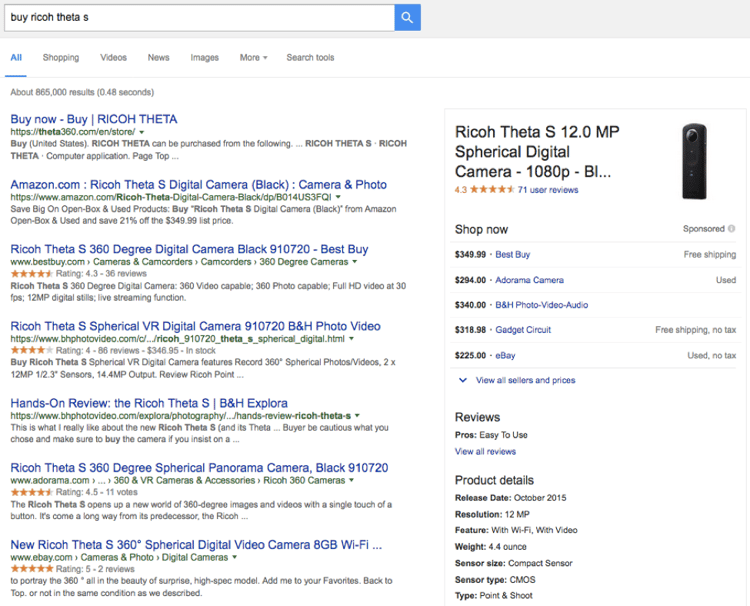
As you can see, on Google-US, the usual suspects are top of the pile for the camera. The Theta S’ official website is top, but as expected, Amazon and Best Buy are right behind. In many cases for brands less famous than Ricoh, a manufacturer’s own product page may be outranked by its Amazon equivalent.
Ricoh Theta S (Google-SG)
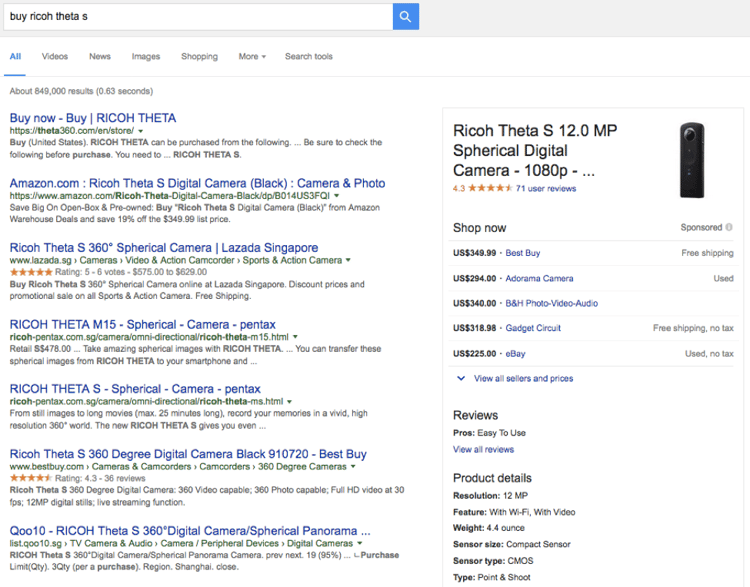
On Google-SG, Best Buy is bumped down by local e-commerce store Lazada. Amazon and the Theta S official website still outrank Lazada, but their local relevance gives them an edge that puts them in Best Buy territory.
Another way search engines figure out if a website is targeted to a specific country is through server location.
The server location for websites tends to be physically near your users, and that can also be a signal to search engines about your site’s intended audience. However, it isn’t a definitive signal as some websites are hosted in a country with better web server infrastructure than their own.
Local addresses and phone numbers on web pages or the use of local language and currency also count towards boosting your local SEO. So does linking to other local sites, so be generous on your website and link to other local websites and perhaps get them to reciprocate.
If you are thinking about doubling up the Singapore factor by using the country target tool in Google’s Search Console, you’re out of luck—Google has caught on to this and does not allow you to geotarget a ccTLD because it is already geotargeted through its extension. So setting the country targeting in Search Console won't have much of an impact on your SERP if you already have a .sg related ccTLD.
Does the .sg extension really boost your brand?
The gold standard for websites is still .com and there are ways, other than a ccTLD, to let your customers know that your business is based in and focused on Singapore.
Having the .sg or .com.sg is definitely better if you are running an online shopping website targeting local clientele. A local extension is more likely to create and sustain a lasting long-term relationship with your customers, just on the implied (through the .sg extension) and actual physical proximity.
For instance, if I am looking for a shop to secure a business loan for my pet shop in Singapore (although Google search results will already nudge me towards local businesses), I’d be naturally inclined to click on a website with a .sg or .com.sg extension as it wouldn’t be worth the trouble and expense to have irrelevant overseas information. A more extensive study on this topic by Moz concluded that: Regardless, we were able to conclude that most Internet users are aware of TLDs and that they are tied to a specific country.
There is also the added bonus attracting physical footfall to your shop as clients will be able to locate you by looking you up on your website to find your address and phone number.
Customers get much comfort out of having the option to pick up a phone and talk to a real person, especially if they are parting with money. The comfort level provided by a local address and phone number to users is infinitely higher than those halfway across the world.

Conclusion
From the two case studies above, we do see a difference in the way Google prioritises SERP for www.google.com.sg. Taking into account the branding and user expectation of having a .sg or .com.sg ccTLD, there is evidence to suggest that if your business is 100% Singapore-centric, having a .sg or .com.sg might be the preferred way to go.
At the end of the day, running a business is hard enough so you may not have enough bandwidth to deal with the intricacies of SEO of your website.
But it would be a mistake to brush it under the carpet as search engines are the main drivers of traffic on the Internet. If SEO is too technical for you to deal with, you may want to leave us a comment below or seek the advice of a local SEO consultant to help your website put its best foot forward in Singapore.
Deciding on a local or generic extension is a big decision in terms of your business and should not be taken lightly. The cost difference is significant but it may be a case of making a call when you feel your business needs that localisation factor immediately.
Remember, you don’t have to purchase all the ccTLDs of your domain name immediately when you won’t be needing them for the next few years. Let your business develop and establish a bit of a public identity first and then gauge the necessity of purchasing the .sg extension or any other ccTLDs.
If cost is a large factor in your decision, then a good option is to start with a .com and try to use other methods to signal the Singapore factor for search engines to pick up.
After all, Google changes its search algorithms between 500 and 600 times each year, and it experiments with over 10,000 changes in that same time. It is virtually impossible to keep up with these changes, so don’t get too obsessed on Google’s movements.
You may be better served focusing your efforts on getting information from authoritative industry publications like Moz to sift out what the SEO community has uncovered as best practices.
However, if your budget allows, it might be worth considering paid advertisements on Google or any other popular search engines most relevant to your market.
The easiest way to ensure that your website comes up high on SERPs is to buy advertisements. Although this may weigh heavily on your budget, using both paid advertisements and organic SEO does boost the likelihood of appearing first on SERP.
Having paid advertisements may help safeguard against changes in policy regarding SEO links. Unfortunately, Google and other major search engines periodically update their guidelines about what is "acceptable" SEO and what constitutes "spam" links, which can have a devastating effect if you use SEO exclusively in your marketing.
*Ng Wei Leen is a marketer and SEO consultant at Capital Match, who often shares his insights on Search Engine Optimization and online marketing when his schedule permits.
